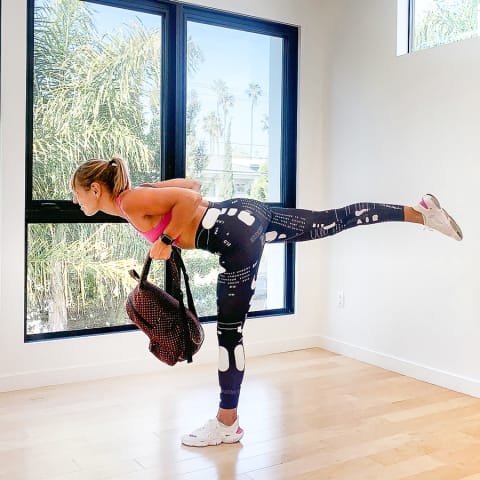Advertisement
How To Do A Single-Leg Romanian Deadlift To Lift & Strengthen Your Glutes


One word you probably hear plenty of when it comes to building strength is stability, and targeting your glutes through exercise is one of the best ways to naturally support your body.
Squats may be one of the most well-known lower-body exercises, but single-leg movements are equally useful for evening out muscle imbalances and individually working both your glutes and legs. Our personal favorite? The single-leg RDL.
Focusing on targeting the hamstrings (or glutes depending on how you do it) the single-leg RDL is accessible to all fitness and strength levels, easily modified by keeping both feet on the ground or increasing your weights. Below, fitness trainer BB Arrington, CPT, provides her top tips for nailing this move for a more balanced base of strength—plus, better stability.
How to do a single-leg Romanian deadlift
Demonstrated by BB Arrington.
How to:
- Stand on one leg with your weight in the opposite hand.
- Keeping your standing leg soft and core braced, allow your back leg to rise up into the air. Keep upper body tight for increased stability.
- With your hips square, drive your hips backward. Return to standing to complete the repetition.
- That's one rep. Complete all reps on one side before repeating on the other side.
Form tips
This movement is particularly useful for working on your balance, so bracing the core and keeping your hips pointed to the floor as you drive your hips backward is essential for making sure that you don't topple over. "If you're looking to target your glutes, you're going to want to think about keeping more bend in the primary leg. If you're looking to target more hamstring, you're going to want to keep that leg straighter," explains Arrington. "The more the leg bends, the more you advantage the glute and disadvantage the hamstring."
One last tip: "Remember to focus on the hinge of the hips instead of how low you can get the weight to the floor—let your hinge determine the depth of the exercise," she adds.
Modifications & variations
In a recent Instagram post, Arrington shares that there are several modifications for the single-leg RDL that can make the movement more accessible to all fitness levels. If you want to stick to one leg but need more help with balance, it can be useful to hold on to a chair in front of you, using only one weight.
If you need to scale it back even further, Arrington shows that you can stagger your legs but keep them both on the ground so you're still focusing the weight on the front leg without adding balance into the mix.
Here are some other useful modifications:
Good Mornings
Demonstrated by BB Arrington.
How-to:
- With dumbbells on your shoulders, step feet out about hip width.
- Soften your knees, brace your core, and hinge your hips backward feeling a stretch on your hamstrings and glutes.
- Return to standing.
Tap Backs
Demonstrated by Janeil Mason.
How-to:
- Start in a standing position, with the mini band wrapped just above your ankles.
- Shift your weight into your left foot, then take a diagonal step back with your right foot.
- Continue for 30 seconds, then switch sides and repeat.
Single-Leg Deadlift & Row

Demonstrated by Krista Stryker.
How-to:
- Start standing with feet hip-width apart. Shift your weight to the right leg, which should be straight with a soft bend in the knee.
- Drive your right foot back behind you, keeping your leg straight or slightly bent as you hinge from the hip, tipping forward until your torso is parallel to the floor. Be sure to keep your hips squared off the entire time.
- Bend your arms and squeeze your shoulder blades back as you bring your hands up toward your chest.
- Lower your arms, then pull your left leg forward and lift your torso back to standing. That's one rep.
- Complete all 10 reps on one side before switching sides.
Add it to your routine
The single-leg RDL fits easily within nearly any lower-body workout, but if you're in need of some inspiration, try adding it to this glute-centric exercise courtesy of yoga teacher and fitness professional Suki Clements. In just 10 minutes, you can burn out your legs and butt while effectively improving muscle strength and balance. Win-win!
If you're just beginning your weight training journey and are looking for an at-home workout that won't leave you limping around the next day, this 20-minute session from Arrington is the perfect fit to get used to the building blocks of strength training. Plus, it's easily adjustable for when you do get stronger.
Whether you're just starting out or have been weight training for years, the single-leg RDL should be a staple in your stability routine.